
We must be careful in the way we interpret particular weather events. Particular events, in and of themselves, do not present to us general data concerning climate. Climate change is general and universal, while particular events often represent specific variables that include effects from climate change, but are not limited by them. If it is extremely warm one day, it might be connected to global warming, but it doesn’t have to be. If it is extremely cold another day, such cold does not disprove global warming (especially since we expect changing weather patterns will bring harsher winters). However, even if we cannot say specific events are entirely related to climate change, we can look at and examine how extreme weather events affect us so that we can be prepared for the extreme changes which will take place if climate change is not halted.
The recent arctic storm in Texas should give us a fair warning of what we are to expect in the future. Through climate change, we will get more extreme weather. While this particular event may or may not be connected with climate change, we do see from it how the poor can be and will be gravely affected by climate change. Texas was not ready for the acrtic freeze. Its infrastructure broke down, leading to people without power, and without power, they did not have heat. Many people died due to the extreme cold. Others barely survived. Those without money or resources of their own had to stay where they were at, hoping for power to be restored. Those, however, who had money, could, and often did, go somewhere else, where they could wait until power was restored without risking their lives. Likewise, those who stayed found that when power was restored, the deregulation meant that power companies could and would charge a premium for their services; that means that those who could not afford to go somewhere else often found that their bills go beyond the money they had left in savings, making them suffer even more harshly for their poverty.
What happened in Texas is just an example of what is happening around the world. The poor feel burdens which they rich do not. And with climate change, the poor will be the first to be adversely affected, as they will not be able to afford what is needed to survive. Concern about climate change is concern about the poor. Taking care of climate change is taking care of the poor. Obviously, the more climate change affects the world, the rich will find that they cannot and will not be able to avoid its consequences. They too will find climate change oppressive and life-threatening, but because they will not experience these consequences as fast as the poor, they risk ignoring what is happening until it is too late. Eventually, the rich will find that no amount of money will be able to save them from their indifference. Climate change will bring extreme weather: from more fires and droughts, to more extreme cold in regions not used to the cold, as the acrtic ice melts and its cold air flows further than it has gone before.
What happened in Texas is a warning; unless we take care of the earth, unless we begin to take climate change seriously, what we saw in Texas is just the beginning of our woes. We do not have the infrastructure in place to deal with extreme weather. Indeed, it is likely we will see extreme weather for years to come, whether or not we get a handle on climate change, because we are feeling the initial effects of climate change itself. We might be able to put a stop to it if we work at it; it is not too late, however, it is too late for us not to experience some of the effects of climate change. We must prepare. We must reinforce our infrastructure, making sure it can hold up to extreme weather, even as we must make sure it is “green.”
Economically, it makes sense to be concerned about climate change, because extreme weather threatens the whole economic system which we rely upon. Likewise, those concerned about the labor force should see the opportunity presented for them to make for new, indeed, better-paying jobs which come as the result of working for and improving the environment and halting climate change. Only those who are shortsighted , or those who are greedy and afraid of losing profits, will not be able to see how concern for the environment will help instead of hinder the economy.
We must truly take climate change seriously, and realize it is a global phenomenon. It requires everyone in the world coming together to fix the problem. It cannot be treated piecemeal, with people in one part of the world taking it seriously while people next to them ignore it and make things worse. We are in this together, and we must all act together to take care of the earth. It is our common home, and if any of us trash it, all of us will be affected. Moreover, as Pope Francis indicated, we must not be haphazard about it, dealing with crisis after crisis without considering the overall environmental situation: we must act, not just react, and we must act with long term considerations if we want to heal the earth, and not just deal with short-term problems thinking that will solve the crisis. We must understand the interdependent relationship of all we do in the world and how it works together to produce the environment:
Ecological culture cannot be reduced to a series of urgent and partial responses to the immediate problems of pollution, environmental decay and the depletion of natural resources. There needs to be a distinctive way of looking at things, a way of thinking, policies, an educational programme, a lifestyle and a spirituality which together generate resistance to the assault of the technocratic paradigm. Otherwise, even the best ecological initiatives can find themselves caught up in the same globalized logic. To seek only a technical remedy to each environmental problem which comes up is to separate what is in reality interconnected and to mask the true and deepest problems of the global system. [1]
This new awareness must actualize changes in the way we do things, including, and especially in the political realm. Politics must once again promote and deal with the common good. Indeed, that is what government is about, the common good, but now, more than ever, our political situation requires us to overcome all selfishness so that our political activity can be and will be transformed into the system which we need to deal with climate change (and other similar social evils facing us today):
What is needed is a politics which is far-sighted and capable of a new, integral and interdisciplinary approach to handling the different aspects of the crisis. Often, politics itself is responsible for the disrepute in which it is held, on account of corruption and the failure to enact sound public policies. If in a given region the state does not carry out its responsibilities, some business groups can come forward in the guise of benefactors, wield real power, and consider themselves exempt from certain rules, to the point of tolerating different forms of organized crime, human trafficking, the drug trade and violence, all of which become very difficult to eradicate. If politics shows itself incapable of breaking such a perverse logic, and remains caught up in inconsequential discussions, we will continue to avoid facing the major problems of humanity. A strategy for real change calls for rethinking processes in their entirety, for it is not enough to include a few superficial ecological considerations while failing to question the logic which underlies present-day culture. A healthy politics needs to be able to take up this challenge. [2]
Indifference to the common good, indifference to the interdependent reality of the world, indifference to the changes which we see before us today because we think we can survive those changes, must all be overcome. Those who think they can survive today will find they will not be able to survive tomorrow unless changes are put in place today. Scripture warns us of the woe which is to befall us if we do not take care of the earth but destroy it (cf. Rev. 11:18). We can see the truth of this when we realize how much harm a little acrtic storm can do to one region of the United States. That is mild in comparison to what lies before us if we do not change our ways:
Climate change is a global problem with grave implications: environmental, social, economic, political and for the distribution of goods. It represents one of the principal challenges facing humanity in our day. Its worst impact will probably be felt by developing countries in coming decades. Many of the poor live in areas particularly affected by phenomena related to warming, and their means of subsistence are largely dependent on natural reserves and ecosystemic services such as agriculture, fishing and forestry. They have no other financial activities or resources which can enable them to adapt to climate change or to face natural disasters, and their access to social services and protection is very limited. For example, changes in climate, to which animals and plants cannot adapt, lead them to migrate; this in turn affects the livelihood of the poor, who are then forced to leave their homes, with great uncertainty for their future and that of their children. There has been a tragic rise in the number of migrants seeking to flee from the growing poverty caused by environmental degradation. They are not recognized by international conventions as refugees; they bear the loss of the lives they have left behind, without enjoying any legal protection whatsoever. Sadly, there is widespread indifference to such suffering, which is even now taking place throughout our world. Our lack of response to these tragedies involving our brothers and sisters points to the loss of that sense of responsibility for our fellow men and women upon which all civil society is founded. [3]
Texas is just the latest to experience extreme weather events. The people were not prepared. They did not think they needed to worry. What we have seen is what happens when we are not prepared. What happened in Texas should be seen as a warning. Unless we do something about it, we will suffer from the ravages of extreme weather patterns that come out of climate change. Indeed, even if we work together to put climate change to a halt, it seems we will experience some of its initial ramifications for the foreseeable future. What Texas shows us is that we are not ready.
[1] Pope Francis, Laudato si’. Vatican Translation. ¶111.
[2] Pope Francis, Laudato si,’ ¶197.
[3] Pope Francis, Laudato si,’ ¶25.
Stay in touch! Like A Little Bit of Nothing on Facebook.
If you liked what you read, please consider sharing it with your friends and family!













